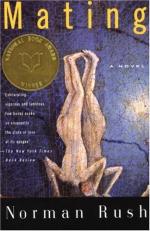|
This section contains 907 words (approx. 4 pages at 300 words per page) |

|
The study of the total genetic information, or gene pool, of a group, is called population genetics. Among the variables important to population genetics are the frequencies of particular alleles and genotypes. If these frequencies remain stable over time, the population is not evolving, and is said to be in genetic equilibrium.
A fundamental law of population genetics, describing the conditions under which genetic equilibrium can occur, is called the Hardy-Weinberg equilibrium principle. According to the Hardy-Weinberg principle, genetic equilibrium requires a situation in which mating is random. This is a situation that hardly ever occurs in human populations. Human societies generally develop complex rules about marriage and mating, including customs and taboos regarding the selection of partners from within the group (inbreeding) or outside it (outbreeding).
Outbreeding increases genetic diversity by introducing new gene versions...
|
This section contains 907 words (approx. 4 pages at 300 words per page) |

|


